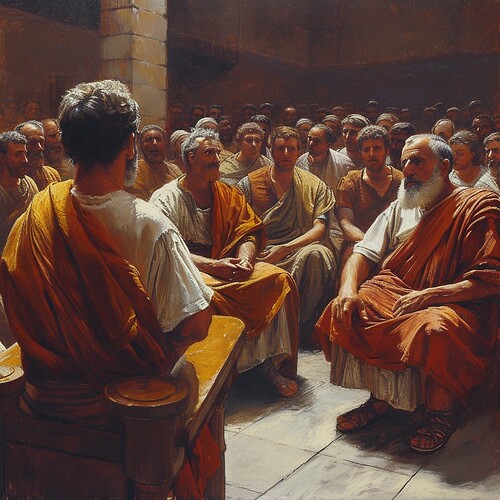![]() February 23: 1 Corinthians 6: Judging Righteously
February 23: 1 Corinthians 6: Judging Righteously
![]() Introduction
Introduction
The apostle Paul’s letter to the Corinthians continues with a call to righteous judgment and the honoring of our bodies – both individually and collectively – as temples of the Holy Spirit.
![]() Paul Addresses Legal Disputes
Paul Addresses Legal Disputes
The apostle Paul, in his characteristic teaching style, addresses the matter of legal disputes. He implores the Corinthians to solve their issues within the church community instead of turning to secular courts.
![]() Key Verse: “Can it be that there is no one among you wise enough to settle a dispute between the brothers?” (1 Corinthians 6:5)
Key Verse: “Can it be that there is no one among you wise enough to settle a dispute between the brothers?” (1 Corinthians 6:5)
![]() The Body as a Temple
The Body as a Temple
Paul urges the Corinthians to honor their bodies as temples of the Holy Spirit, avoiding sexual immorality. He argues that as we are united with Christ, we should treat our bodies with the same respect Christ would.
![]() Key Verse: “Or do you not know that your body is a temple of the Holy Spirit within you, whom you have from God? You are not your own” (1 Corinthians 6:19)
Key Verse: “Or do you not know that your body is a temple of the Holy Spirit within you, whom you have from God? You are not your own” (1 Corinthians 6:19)
![]() Key Themes and Reflections
Key Themes and Reflections
- Righteous Judgment: Paul’s teaching here invites us to think critically about how we solve disputes and whether our judgment aligns with God’s principles.
- The Sacredness of the Body: The calling to view and treat our bodies as temples of the Holy Spirit sheds light on the Christian viewpoint of physical health and morality.
![]() Today’s Application
Today’s Application
These teachings call for us to be mindful of how we handle disagreements, opting first for Godly counsel within our community. Therewith, we are encouraged to honor our bodies by maintaining purity, recognizing that we house the Holy Spirit.
![]() Hidden Gem
Hidden Gem
The Greek word for ‘temple’ used in verse 19 refers specifically to the sanctuary or Holy of Holies – the innermost, most sacred part of the Jerusalem Temple. This underscores the profound holiness and sanctity of our bodies.
![]() Reflective Q&A
Reflective Q&A
![]() How does resolving disputes amongst believers within the church community enhance unity?
How does resolving disputes amongst believers within the church community enhance unity?
A: Resolving issues internally fosters understanding, peace, and cohesion in the Christian family. It keeps our witness untarnished, modeling Christ’s love and grace.
![]() What does it mean to treat our bodies as temples of the Holy Spirit?
What does it mean to treat our bodies as temples of the Holy Spirit?
A: It means recognizing the sanctity, value, and holiness of our physical bodies. This leads to making conscious decisions that honor our bodies - in purity, health, and self-care.
![]() Join the Discussion
Join the Discussion
What are your thoughts on today’s reading? How does recognizing our bodies as temples of the Holy Spirit impact the way we live?
![]() See you tomorrow in ‘1 Corinthians 7’, where we’ll explore themes of marriage and singleness in Christian living. There is wisdom here for all, regardless of your current life season.
See you tomorrow in ‘1 Corinthians 7’, where we’ll explore themes of marriage and singleness in Christian living. There is wisdom here for all, regardless of your current life season.
